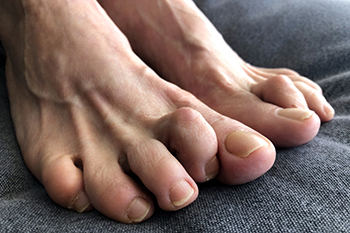Causes and Risk Factors for Hammertoe
Tuesday, 05 November 2024 00:00
Hammertoe is a condition characterized by an abnormal bending of the toe at the middle joint, resembling a hammer. This deformity often arises due to an imbalance in the muscles and tendons that control the toe's position. Common causes include wearing ill-fitting shoes, particularly those with narrow toe boxes, which can exacerbate the issue. Other contributing factors may involve inherited foot structure, arthritis, or previous injuries to the toes. Certain risk factors can increase the likelihood of developing hammertoe, such as age, as the condition is more prevalent in older adults, and lifestyle choices that include frequent use of high-heeled or tight footwear. Hammertoe can be uncomfortable and unsightly. If you see the beginning signs of hammertoe or have pain from an existing hammertoe, it is suggested that you consult a podiatrist who can help you manage this condition.
Hammertoes can be a painful condition to live with. For more information, contact one of our podiatrists of Bazzi Podiatry. Our doctors will answer any of your foot- and ankle-related questions.
Hammertoe
Hammertoe is a foot deformity that occurs due to an imbalance in the muscles, tendons, or ligaments that normally hold the toe straight. It can be caused by the type of shoes you wear, your foot structure, trauma, and certain disease processes.
Symptoms
- Painful and/or difficult toe movement
- Swelling
- Joint stiffness
- Calluses/Corns
- Physical deformity
Risk Factors
- Age – The risk of hammertoe increases with age
- Sex – Women are more likely to have hammertoe compared to men
- Toe Length – You are more likely to develop hammertoe if your second toe is longer than your big toe
- Certain Diseases – Arthritis and diabetes may make you more likely to develop hammertoe
Treatment
If you have hammertoe, you should change into a more comfortable shoe that provides enough room for your toes. Exercises such as picking up marbles may strengthen and stretch your toe muscles. Nevertheless, it is important to seek assistance from a podiatrist in order to determine the severity of your hammertoe and see which treatment option will work best for you.
If you have any questions, please feel free to contact one of our offices located in Detroit, West Detroit, Northwest Detroit, Sterling Heights, Hamtramck, Dearborn Heights, Madison Heights, Redford, and Livonia, MI . We offer the newest diagnostic and treatment technologies for all your foot care needs.




